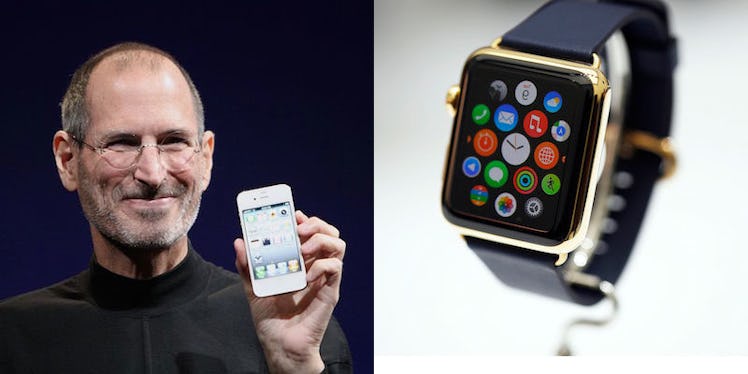
How Apple Became The $700 Billion Innovation Machine It Is
Not a lot of things can move me these days.
Sure, I'll admit I'm a sucker for the occasional viral video about helping the homeless or animals being rescued, but there's something a bit more mainstream that's been catching my eye over the years.
I was flipping through the TV last night, and I happened to catch a glimpse of an ad for Apple.
The ad, aptly titled “Us,” lays the foundation of what Apple believes is the centerpiece of its success: people.
Unless you live under a rock, you know the product it's currently promoting is its iWatch or, as I like to call it, an iPhone for your wrist.
The commercial was quite intriguing. Its focal points were the day-to-day interactions we have with one another.
From sending a "thinking about you" text to picking up flowers and apologizing, it seems as though Apple was trying to appeal to our emotions, which is the base for all relationships.
This warm approach to clientele is paying dividends, literally.
In November of last year, Apple stock was close to $120 a share, which, by market standards, gave it a then valuation of more than $700 billion dollars.
That's not even the crazy part. Cantor Fitzgerald, one of the premier investment banks, is now saying Apple could top the $1 trillion benchmark as soon as January 2016.
For as long as I can remember, Apple has been targeting us through the way its products make us feel.
Ever since its inception, Apple has been a staple for empowering people to believe in themselves by somehow mentally tying their products to greatness.
This sentiment is evidenced by one of its first slogans, which debuted in the mid-1980s: "The power to be your best."
Wouldn't you be drawn to such a majestic sensation? Wouldn't you want to be a part of something cool?
Steve Jobs, its late co-founder, chairman and CEO, believed people's sheer determination would be heightened through the use of Apple's technology, and the power of the mind would be unleashed.
Jobs, an adamant hater of branding, believed "the most important thing was people's relationship to the product."
In other words, his vision for driving business was focusing more on the inherent value Apple products brought to the table as opposed to actual marketing to consumers.
Jobs sold the sizzle, not the steak; the steak would eventually sell itself. As a former Android user, I'm living proof of this concept.
I'm running on an iPhone 5c and a MacBook Air with no intention of going back anytime soon.
"Think different" is the Apple motto to which most of us can relate. Jobs, most recently portrayed by Ashton Kutcher, always had a knack for finding ways to stand out.
This, in turn, would eventually make Apple a company that couldn't be ignored.
Apple is built on the idea the status quo is not the only way to do things.
Just because the norm is already established does not mean new ideas cannot be implemented, let alone succeed. Jobs wanted to make sure Apple didn't just think "outside the box."
Jobs said screw the box. Millennials often see Jobs as one of the most iconic figures of our time; I haven't come across a single Instagram account that doesn't feature at least one of his quotes.
Apple knew appealing to our generation was imperative, and it needed to acknowledge us in order to take the company to new heights. Style will only get you so far in life.
Eventually, you need to become a source of substance. Perhaps I can refer you to the comical Justin Long commercials of the mid-2000s.
During this time, Apple shifted its focus to productivity, all while making us feel doing things more easily will ease the pain of stress.
Its rise often came at the expense of Microsoft and the personal computer, which were its main competitors for market share at the time.
Frame of mind, along with sense of self, have been the backbones of Apple's prosperity throughout decades.
The "anything you can do, I can do better" attitude suited Apple perfectly.
The company has made its mark by looking frustration square in the eye and presenting a solution in a refreshing way.
Fun is undoubtedly one of the most popular emotions in human beings. As long as we're having fun on a daily basis, we're careless creatures.
Apple has jumped all over this fact and taken it to the bank.
Most of the company's advertising and marketing caters to our innate desire to be happy, to experience perpetual joy and live a worry-free existences.
Business and relationships are inevitably intertwined, and Apple knows this all too well.
Reach me on a human level, and it's a borderline guarantee that you will, at the very least, have my attention.
They say a product is worth as much as people are willing to pay for it, and these days, Apple doesn't have a shortage of sales.
Of course, I can't speak for everyone, but as for me? Just shut up and take my money.